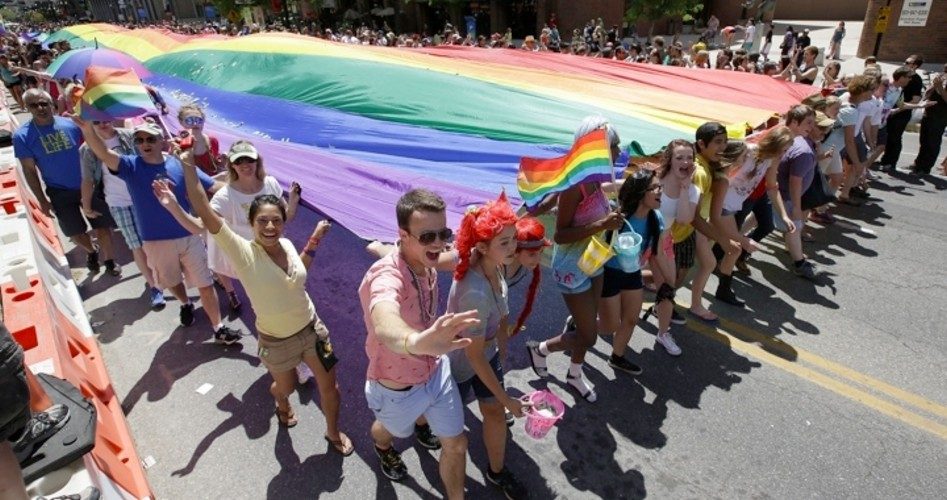
A Salt Lake City police officer who was suspended over his objections to working the city’s notorious “gay pride” parade has resigned from his position, the police department said June 9. But the central issue in the entire episode appears to be a fabrication by police officials over the reason the unidentified officer was suspended from the department in the first place. While the department said that the officer refused to work the June 7 Utah Pride Parade, his attorney insists that his client simply requested to be re-assigned to another duty at the event so that he would not have to be directly involved in the offensive homosexual spectacle.
According to attorney Bret Rawson, his client “did not — as initially indicated by SLCPD officials — refuse the assignment, and would have ridden in the parade had he been ordered to do so,” reported the Salt Lake Tribune.
Rawson said the officer “was surprised that he was placed on administrative leave — a disciplinary action against him — and he feels this was a violation of his rights.” The attorney explained that, contrary to the spin of the Salt Lake City Police Department (SLCPD), the officer never refused the assignment, which according to the Tribune, would have required him “to join other motorcycle officers in choreographed maneuvers at the beginning of the parade.” Instead, he requested that his commanders give him a “less conspicuous” role at the event, which could have included traffic enforcement or security.
“The officer simply felt that the level of participation required in the event could be perceived as endorsing or advocating in favor of the [homosexual] community, a position which made him uncomfortable, given his personal and religious beliefs,” Rawson said. He emphasized that the policeman “never refused to do his job. He specified that if he was required to do [the motorcycle assignment], he would do that. So he was very surprised that he was put on administrative leave.”
The officer felt that the department defamed and ridiculed him because of his request, and that his rights were violated. “He feels that the same protections that afford individuals to participate in a parade … are the very constitutional protections that were not afforded to him,” said Rawson.
While spinning the officer’s request as a refusal, the SLCPD also appeared to use the episode as an opportunity to solidify its relationship with Utah’s homosexual community, with department spokesperson Lara Jones announcing that “we have gay men and women that serve in the police department. One officer’s situation does not reflect the vast majority of officers that work in the Salt Lake City Police Department, and certainly not [Police Chief Chris Burbank’s]. Personal opinions in the police department have evolved along with the community.”
In fact, reported the Salt Lake Tribune, Chief Burbank “has marched in the parade in previous years,” and had assigned three deputy chiefs to march in his place at this year’s event.
Jones told reporters that “the vast majority of officers understand: When they put their badge on and come to work, they leave their personal beliefs at home, and we provide service to the community.” She added that “we don’t tolerate bias and bigotry in the department, and assignments are assignments. To allow personal opinion to enter into whether an officer will take a post is not something that can be tolerated in a police department.”
Steven Ha, executive director of the Utah Pride Center, took the department’s lead in the case, offering to reporters that “clearly the officer’s act was more than just smelling of bigotry…. I think the act was bigotry, choosing to not do a duty that is sworn by police officers to do.” With feigned concern Ha said that “I think an individual in any community, of any race, would be concerned that an officer is not able to carry out the duty of that officer.”
It is no surprise that the officer had a problem with the homosexual event in question. According to the Associated Press, the typical Utah gay pride extravaganza features all the trappings of such parades in scores of metropolitan areas nationwide: “drag queens, scantily clad men in speedos and women in bikinis.” In fact, observers at homosexual events such as the Utah parade confirm that nudity and overt homosexual behavior of a sort that would offend the sensibilities of a morally inclined individual are not uncommon.
Rawson told the AP that his client’s presence as a police officer would have had him “essentially participating in the actual parade. It’s more than doing traffic, or patrol, or regular police duties.” Rawson insisted that his client “did nothing improper. He has never shown any prejudice or bigotry to any person in his role as a SLC police officer.”
Nonetheless, the backlash the officer received because of the department’s mishandling of the situation has prompted him to resign his position under duress, although Rawson emphasized that it would be inaccurate to say his client had quit. “It’s a matter of him being ‘constructively terminated,’ which is legalese for ‘[the SLCPD] made it unreasonable for me to stay, so I’m leaving,’” Rawson said. He added that “no reasonable, rational person could stay at work under these circumstances.”
In a statement the department said that it had “received a written resignation from the officer under internal investigation related to an assignment at last weekend’s Pride Parade. This closes the internal case. In light of pending litigation, no further comment will be provided at this time.”
Rawson confirmed the officer “has made it clear to the SLCPD that he is not returning. He feels he has been subjected to needless ridicule by the department for merely expressing a desire to work the parade without participating in the parade.” Added the attorney: “They left him no choice.”
Photo of people carrying flag during Salt Lake City “gay pride” parade: AP Images


